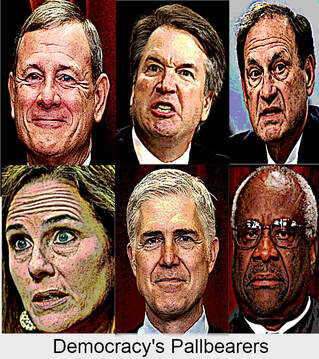
–Dr. Martin Luther King, Jr.
During the last half of the 20th century, the U.S. Supreme Court did, in fact, make manifest Dr. King’s optimistic declaration. The Court’s decisions, for the most part, moved the country forward to a better place: rulings on discrimination, voting rights, criminal justice, race relations, marriage, privacy and other fundamental matters deeply affecting all of us bent the country toward justice.
Not so much anymore. We have come to expect, alas, that Supreme Court terms will be unsettling. The 21st century rendition of the Court, increasingly with each term, has reversed direction, bending the arc the other way. The last two Supreme Court terms witnessed a retreat with respect to many of the advances of the prior century.
The 2023-24 Supreme Court term just began and we can expect that it will prove to be equally tumultuous. The Court will consider a docket full of cases the decisions in which will impact heavily on every one of us as well as on the future of our increasingly fragile democratic republic. Some of the key cases that could continue the Court’s backsliding-to-the-future include:
Whether domestic abusers should be allowed to have guns. The Court’s decision will go a long way toward telling us just how sacrosanct the Second Amendment is. Justice Thomas’s nonsensical standard that a gun law is valid only if it is rooted in our early history and tradition could skew the outcome in favor of wife-beaters, mindful that until the second half of the 19th century, women were deemed the property of their husbands to do with whatever they wished.
A series of cases threaten the rulemaking authority of administrative agencies. The first case to get a hearing contests the constitutionality of the Consumer Financial Protection Bureau, an Obama construct that the hard right hates and has attempted to bring down before. The totality of these cases, if upheld by the Court that last term viewed such challenges sympathetically, could severely weaken the full panoply of health, safety, business and other regulations.
Racial gerrymandering. The Court will decide whether the South Carolina legislature’s congressional district redraw, which moved 30,000 African-American voters between districts in order to make a district safer for Republicans, violated the Voting Rights Act. South Carolina claims that the adjustment was purely for political reasons with no racial intent. Uh huh.
Social media content moderation. The Court will examine whether Florida and Texas laws regulating social media violate the First Amendment’s Free Speech clause. Both states’ restrictive measures were prompted by conservative complaints that Facebook, X, et al., favor liberal posts and discriminate against right-wing ones. Given the barrage of reactionary misinformation countenanced by both platforms, this is a hard argument to make.
What makes this term all the more fraught is that this Court is rapidly establishing itself as the most corrupt in history. Two justices—Thomas and Alito—swim in sleaze. A steady stream of new revelations about their unsavory relationships with right-wing ideologues/zillionaires, often with business before the Court, keeps being uncovered by the media. To date, revelations of their smarmy doings have failed to constrain their disgraceful conduct. They continue to sit on cases that cry out for recusal, and continue to vote against the interests of the citizenry. Watching all of this, the weakest Chief Justice in history sticks his head in the sand, refusing not only to institute a serious ethics code, but is also too timid to enforce the feeble one that currently applies.
Two other justices should not even be on the Court, but are thanks to the sordid maneuverings of Mitch McConnell, whose hypocrisy vis-a-vis Court appointments gives new meaning to the term, “brazen.” To top it off, the third of the hard-right Trump appointees won his seat despite a strongly alleged history of boozy sexual aggression. This cast of character-less characters defines this Court as the most partisan and reactionary in history, the Taney Court that decided Dred Scott (upholding the Fugitive Slave Act) and the Fuller Court that decided Plessy v. Ferguson (endorsing segregation) notwithstanding.
In 2000, 62 percent of Americans surveyed had a positive view of the Court. Today, only 40 percent believe that the Court is an honorable institution. The plummet in Court approval is understandable given the torrent of horrible decisions that have come down from the Court on issues such as campaign finance, guns, abortion, the environment, voting rights, etc., overlaid by the Court’s abandonment of any pretense that it has a moral center. What is incomprehensible is that four in ten Americans still believe that the Court is doing a good job.
Dick Hermann
October 7, 2023


 RSS Feed
RSS Feed